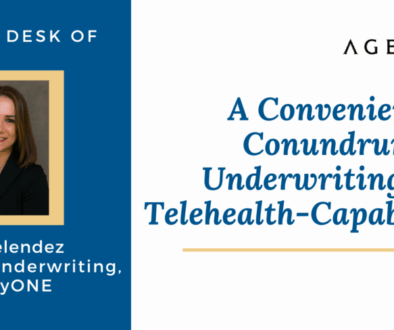Underwriting & The Economic Impact of Non-Disclosure
$75 Billion… BBBBillion. That is the number.
A recent article in On the Risk, written by RGA Reinsurance and MIB, estimated that the insurance industry loses $75 billion annually to fraud. This impacts both policyholders (higher premiums) and insurance and reinsurance carriers!
The Impact of Accelerated Underwriting
The advent of Accelerated Underwriting has only increased this number, as there is now less direct agent involvement in the process. While the industry relies increasingly on computer and electronic applications that are completed by clients, telephone interviews, and para-medical services,there is more of a chance for client non-disclosures. These non-disclosures may still result in policies being issued, but advisors remain responsible for the representations in the policy.
This makes your field underwriting more important than ever. Thoroughly preparing clients for the application process—including the insurance exam, interview, and entire underwriting procedure—is crucial in achieving accuracy and preventing non-disclosures. Reading the whole question…answering with the whole truth.
Smoker or Nonsmoker? “They’ll Never Find Out.”
If nicotine is present in the urine of a client who admitted “no tobacco use” on an application or exam, they will be assessed SMOKER rates. The client will not be reconsidered for a non-tobacco class if pivoted to another carrier for 12+ months.

This is the case even if that carrier would have otherwise considered nonsmoker rates. The rationale is simple: if clients don’t tell the truth on this matter, the carrier may be wondering what else they could be hiding.
For example:
- An occasional cigar user might still qualify for nonsmoker status within certain carrier guidelines—even with nicotine present in the urine test—if the client disclosed qualifying tobacco use upfront.
- A non-disclosure, however, inhibits the advisor from sending the case to another carrier as they would have no choice but to offer tobacco rates.
Underwriting: The Importance of Full Disclosure
At AgencyONE, we cannot emphasize enough the importance of honest and complete disclosure. Only a handful of carriers allow nonsmoker rate classifications for applicants who test positive for nicotine and admit use of tobacco products. We know these carriers and we specialize in matching clients to the best carriers for their tobacco use history, whether they use:
- Cigarettes
- Cigars
- Vaping
- Nicotine patches
- Nicotine pouches
- Smokeless tobacco
- Chewing tobacco
- Nicorette/nicotine gum
Given the increasing frequency of non-disclosures, perhaps the carrier tobacco use question should be changed and/or clarified since the wording of the question often results in a client’s non-disclosure. Simply asking a client “do you smoke cigarettes?” is NOT the right way to ask a tobacco use question.
Consequences of Non-Disclosure
Failure to disclose tobacco use can result in a contested and unpaid death claim according to a New York legal opinion. Additionally, the death benefit will not be adjusted, and the claim will remain unpaid—with potential forfeiture of premiums already paid.
Previously, if a client “forgot” about their tobacco use within the two-week positive urine testing window, the case could pivot to another carrier. But today, with industry-wide cloud-based data sharing, carrier exam results and non-disclosure statements are widely accessible. This non-disclosure will result in your client waiting a year before they can be considered again for non-tobacco rates.
Case Study
Mr. Smith is 47 years old and applying for $5,000,000 of 20-year-term coverage for the purpose of income replacement. During Mr. Smith’s insurance exam, he answered “no” to the tobacco use question. However, when the lab results came back, Mr. Smith’s urine was positive for nicotine metabolites. When requestioned about the positive result, Mr. Smith stated that he occasionally chewed nicotine gum and did not think to answer this question “yes” since it is non-smoked nicotine use and only occasional.
Nothing speaks louder than the economic impact of that non-disclosure. If the client’s nicotine use had been disclosed on the formal carrier paperwork (this particular carrier has favorable guidelines for nicotine gum use), Mr. Smith would have been considered for their Standard Plus Non-Tobacco class and the annual premium would have been $10,285. Because of the client’s inadvertent non-disclosure, he was considered a Standard Tobacco class, which came with an annual premium of $41,485! Mr. Smith must either accept this more than 400% increase in premium or wait a year to be considered for the Standard Plus Non-Tobacco class.
Advisor Responsibilities in the Age of Accelerated Underwriting

Advisors play a critical role in the Accelerated Underwriting process. It is their responsibility to ensure that clients understand the importance of providing truthful and accurate information. Advisors must also be well-versed in the criteria for the Accelerated Underwriting program and exercise diligence in educating their clients. While advisors can guide and inform, the accuracy of a client’s statements ultimately remains beyond their control.
To mitigate risk, educate your clients on how the process works, the existence of digital health data (i.e., medical claims, prescription records, electronic health records, etc.), and recommend they access their Patient Portals to verify details such as:
- Height & weight
- Blood pressure
- Medications
- Medical history
- Dates of last visits
- Other involved physicians
This helps align client information with underwriting databases, and ensures accuracy, efficiency, and faster processing.
AgencyONE Resources for Advisors
We provide an entire For Client Use section on our website which is available to our AgencyONE 100 advisors and their clients:

- Client-friendly videos
- One-pagers
- Guides for explaining the underwriting process
These resources make conversations with your clients easier and provide thorough and understandable instructions for them to follow.
Final Thought: Non-Disclosure = FRAUD
Failure to disclose is no joke. If intentional, it constitutes fraud.
Advisors, take the time to educate your clients on the importance of accuracy and honesty in the application process—because the industry is paying close attention.
Contact AgencyONE’s Underwriting Department at 301.803.7500
for more information or to discuss a case.




